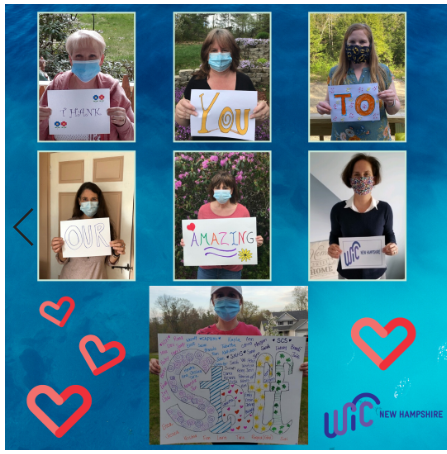 The COVID-19 pandemic has resulted in significant job loss and loss of income for families across the nation. Programs like WIC and SNAP have served as a safety net for an increasing number of families who are newly eligible as a result of the pandemic. These programs have seen significant increases in their number of applicants. State WIC agencies have reported an increase in WIC applications since the start of the pandemic, upwards of 6%. Since March, New Hampshire WIC has seen an average increase of 12% in WIC participation.
The COVID-19 pandemic has resulted in significant job loss and loss of income for families across the nation. Programs like WIC and SNAP have served as a safety net for an increasing number of families who are newly eligible as a result of the pandemic. These programs have seen significant increases in their number of applicants. State WIC agencies have reported an increase in WIC applications since the start of the pandemic, upwards of 6%. Since March, New Hampshire WIC has seen an average increase of 12% in WIC participation.
As a result of the pandemic, many WIC providers have transitioned from in-person clinic operations to remote service by serving participants telephonically or through other modes of technology. Flexibilities for WIC, including remote service and remote batch issuance, were included in the Families First Coronavirus Response Act which provided authority to the U.S. Department of Agriculture (USDA) to grant these waivers. "Without these waivers, we would not be able to meet the increase in need during the pandemic and serve our existing participants," says New Hampshire WIC Director, Lissa Sirois. Because WIC waivers have provided program flexibilities, WIC staff have been able to continue their personal engagement with families through virtual nutrition education, breastfeeding support, among other services.
In 2017, New Hampshire WIC established a formal partnership between SNAP and WIC. Ms. Sirois says this partnership was and still is "critical to expanding WIC’s reach." When families who have children under 5 enroll in SNAP, the WIC office can conduct outreach to those families to determine if they are interested in enrolling in WIC. These programs work in tandem to support the economic stability of families and the health and growth of children.
New Hampshire WIC Director Lissa Sirois says that "all four of the local WIC providers in the state have operated very differently during the pandemic based on the specific needs in their communities and each has done an incredible job in serving their participants. Every local provider has seen an increase in WIC participation and staff have been working overtime to ensure that their families receive the nutrition and public health support they need to carry them through these stressful times."
The USDA’S WIC waiver authority is expiring September 30, 2020, and would leave families to choose between an increased risk of exposure to COVID-19 while seeking in-person WIC clinic service or foregoing WIC to prevent exposure. Parents of young children should not have to make these difficult choices. To ensure the continuation of safe WIC service delivery, Congress must extend USDA’s WIC waiver authority until at least September 30, 2021. More than 350 local WIC service-provider agencies from all 50 states, who are on the ground serving participants and seeing the effects of this pandemic firsthand, have also shown their support for an extension of WIC waivers.
How can you get involved?